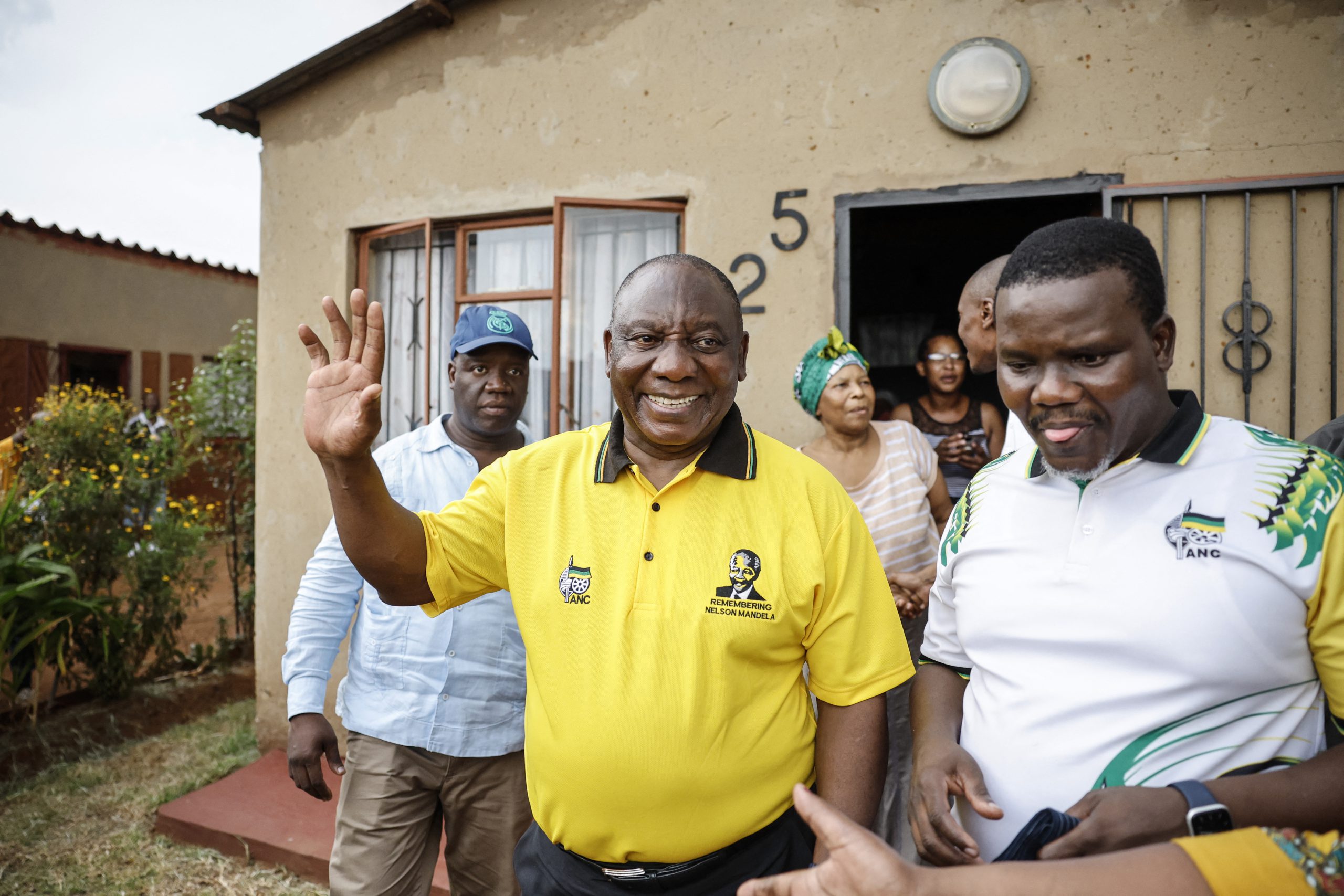Several of South Africa’s political parties recently released their election manifestos in stadiums filled with supporters.
But the idea that parties should simply communicate public policy proposals at launches, with minimal rational and meaningful public engagement, is problematic.
Parties should have platforms beyond rallies to communicate with the public on how they arrived at the solutions their manifestos propose. The electorate deserves to know the background analysis done, analysis tools used, how the policies will be executed and at what projected costs.

African National Congress (ANC) president and South African President Cyril Ramaphosa (C) greets residents during a door-to-door campaign in Ekurhuleni on March 10, 2024 ahead of the South African Presidential elections scheduled for May 29, 2024. Photo by OLYMPIA DE MAISMONT/AFP
All too frequently, the solutions provided in manifestos are simplistic, time-consuming and expensive to implement.
Although being frank during the campaigning season does not suit the short-term political objective of winning an election, a mature democracy necessitates active citizens. Furthermore, political parties must stop treating the public as uninformed but rather as intelligent and important actors in the democratic process.
A cursory look at several manifestos shows many focus on similar, if not the same, issues. These include load-shedding, economic growth, unemployment, crime, service delivery, and corruption. What is unclear is the process they undertook to identify and prioritise the solutions to those problems.
Some politicians do not seem to fully appreciate the nuances of governance, the challenges of implementing policies within the complexity of a democratic state.
Little consideration is given to how legal frameworks, judicial processes, political gridlock, and party-political dynamics can trip up poorly conceived policies. This problem appears to affect both the incumbent ANC and opposition parties equally.
Given the proximity of the 29 May election date, there is little time for parties to better work with the public, or develop practicable policies, but the risks of the current shortsighted approach must be raised.
The framing of public policy issues helps voters understand the solutions provided and make their own informed judgments.
For instance, the former mayor of New York, Rudy Giuliani, made it clear when he campaigned for office that his city policies were framed with the “broken windows theory” in mind.
According to Psychology Today, the theory posits that “visible signs of disorder and misbehaviour in an environment encourage further disorder and misbehaviour, leading to serious crimes. The principle was developed to explain the decay of neighbourhoods … One unrepaired broken window is a signal that no one cares and so breaking more windows costs nothing.”
As a result of this framing, Giuliani’s “law and order” approach centred on harsh policing, resulting in widespread incarceration and criminalisation, including of those who had committed minor offences that ordinarily did not warrant prison. This approach was heavily criticised as creating more problems than solutions because he did not seem to have factored in the ramifications of his policy framing.
A realistic and pragmatic policy framing process can also help the electorate appreciate that some policies might take a long time to implement. The lack of realistic framing can cause issues, as we are seeing with the National Health Insurance (NHI) bill.
According to Innovative Medicines South Africa, the NHI reform originated with the ANC Health Plan of 1994, which advocated for a mandatory insurance system. Yet it is only now, in 2024, that parliament has voted for the bill and President Cyril Ramaphosa has “just started looking for a pen to sign it into law”.
The bill has already come under heavy criticism and legal scrutiny by some stakeholders.
On 29 February, Daily Investor reported that “many of the bill’s critics have pointed out that it has yet to provide an adequate funding model for NHI in South Africa”.
Some in business have expressed their fear of corruption and doubt the state’s capacity to effectively implement the NHI. There are also myriad legal challenges against the NHI bill.
This illustrates the point that many manifesto promises are simply too complex and difficult to implement in the time envisaged.
In his paper titled “Is it possible to govern well in the age of populism? Populism as a reaction to the troubles of good governance”, Callum Watts says, “Effective government is one that is able to identify, prioritise, and meet the ever-changing needs of the people.”
The challenge that trips up many politicians is identifying and prioritising problems while designing the right solutions for the right problems.
Dennis C Grube, in his book Why Governments Get It Wrong: And How They Can Get It Right, lists what he calls “four ducks” that governments need to consider, to have a chance of winning the politics of public policy and service delivery.
He states, “The possibility of success is predicated on four aspects — the four ‘ducks’ that must find their way into a row.” First, there must be a clearly identifiable problem. Second, there must be an understandable story about why it is a problem. Third, there needs to be convincing data and evidence to back up the story. Fourth, there must be the right policy solution.
According to Grube, if these ducks are not in a row, then public policy solutions might not work. This makes it imperative for parties to meaningfully work with the electorate on the process they undertook to arrive at proposals.
It is not enough that political parties conduct focus groups, commission polls and do their own surveys. Those tools help them understand what people think. However they are not meaningful forms of engagement in that they are often one-directional.
To ensure that Grube’s ducks are in a row, Dunn proposes a process of “problem structuring”, which he defines as “a process for testing different representations of a problem situation [and] is the central guidance system of policy analysis”. Problem structuring methods are used to produce information about which problem to solve and how to do so effectively.
Examples of tools include problem trees, influence diagrams, argument mapping and cost-benefit analyses. Emerging from the process would be workable, predictable and costed policy outcomes that would probably yield sustainable solutions.
This does not take away the unpredictability of what former Wall Street trader Nassim Nicholas Taleb, in his 2001 book Fooled by Randomness, called “black swan events”. These are unpredictable and major problems such as the 2008 global financial meltdown or the Covid-19 pandemic. Problem structuring helps decision-makers think through, and develop mitigation measures.
If predictions that the ANC might not achieve a convincing majority in the elections bear out, and South Africa is to be governed by a coalition, then policy problem structuring becomes even more critical. For coalitions to succeed in the long run, alignment on how parties frame policy solutions to the country’s governance problems will be crucial.
I suspect that the lack of proper policy structuring and policy solution alignment might explain the ructions that continue to rock many local government coalitions.
Even more concerning is that, to date, citizens have been excluded from insight into how consensus among coalition partners leads to council decisions, highlighting that they are not meaningful key partners in governance.
Unless public accountability is normalised, this would probably worsen if we were to have a coalition national government.
For us to have an informed electorate that tempers its expectations post-election, an essential ingredient of a maturing and functional democracy, then political parties have a responsibility to take voters through their “thinking” processes, not merely pronounce them during rallies.
They should also be candid about the intrinsic delays typical in democracies caused by party-political disagreements and horse-trading.
Without this, we will continue to have an unsettled electorate increasingly receptive to eloquent and charming political operatives who simply want the levers of power.
Parties must put their ducks in a row and take the electorate and the task of entrenching democracy in South Africa seriously. This will require an investment of resources such as money, time, and intellectual capacity.
This article first appeared in Mail & Guardian on 5 April 2024.
Patrick (Lonwabo Mepeni) Kulati is CEO of Good Governance Africa, Southern Africa Region. He is author of the book A Gap in the Cloud, a speaker, content creator, executive coach, and leader. The founder of Kulati Coaching, which equips professionals and organisations with personal and professional development, Patrick also runs The Blackman’s Coach which focuses on coaching and transforming young men to be enterprising, independent, responsible, and value-adding men. He has served as CEO for the International Council for Local Environmental Initiatives (Africa); CEO of the Paraffin Safety Association of Southern Africa; CEO of Habitat for Humanity SA and National Director and CEO for SOS Children’s Villages in South Africa.












